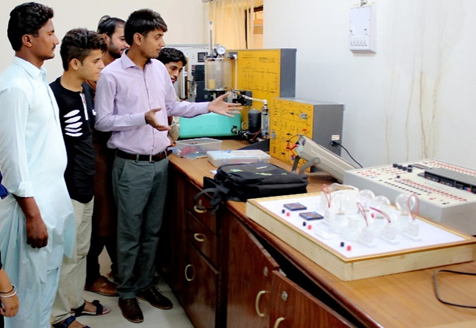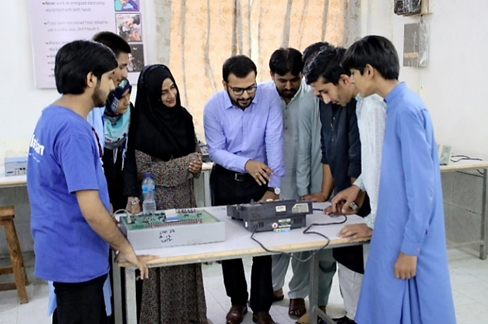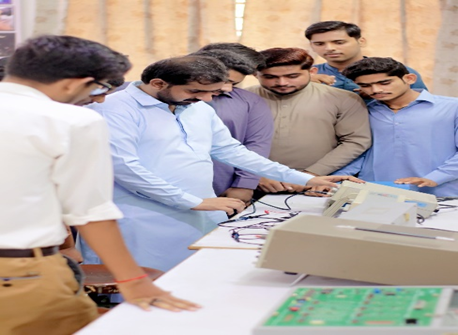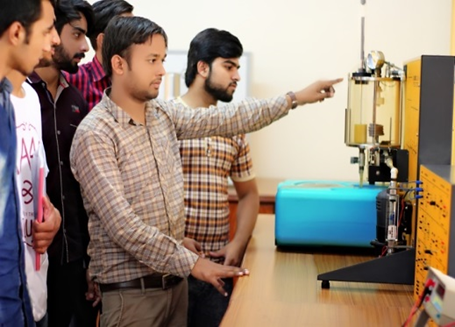
Electronics Engineering Technology is intricately woven into many sectors of industry which affects our daily life. Electronics Engineering Technology is an engineering technology field that implements and applies the principles of electrical engineering. Electronics Engineering Technology deals with the design, application, installation, manufacturing, operation, or maintenance of electrical/electronic(s) systems. Electronics Engineering technology is one of the most evolving fields. It has evolved from telegraph communication to wireless communication to satellite communication to fiber optic telecommunication and the data rate has reached up to several 100 MBs per second. The evolution of digital computers from ancient abacus digital computers to the latest supercomputers is also because of the development of electronics Engineering technology. Electronics Engineering Technology has enabled every production, processing, and manufacturing industry from manual to automatic control. Electronics Engineering Technology is responsible for the safe takeoff and landing of super jets. In short electronics engineering technology has brought human life to the bed of roses.
To carry on these development electronic engineering professionals are needed. If you’re a critical thinker who enjoys putting things together and integrating multiple systems, then a degree in Electronics Engineering Technology could be the beginning of your new career. The BBSUTSD’s Electronics Engineering Technology degree is a skill-based degree with hands-on labs and simulation under the supervision of foreign-qualified and industry-experienced faculty. Beginning with electrical fundamentals, the Electronics Engineering Technology program encompasses the knowledge of a variety of subjects in the diverse field like Electronic Circuits & Devices and their applications, Electronics Circuit Design, Digital Logic Design, Microprocessors & Interfacing, Automation and Robotics, Communications System Technology, Signal & Systems, Industrial Electronics, Power Electronics, VLSI Design, Artificial Neural Networks, Instrumentation & Control, FPGA based systems, Wave Propagation and Antennas, Computer Communication & Networking. The program is accredited by the National Technologist Council (NTC) and the Higher Education Commission (HEC) of Pakistan.
"To develop competent technologists and responsible professionals in Electronics Engineering Technology to face the current and future challenges of technological development."
"To blend technical knowledge with practical skills and innovative mindset to develop a problem-solving approach, and provide quality education and research to address national and international challenges by seeking continuous improvement of knowledge skills, and implanting right ethical values."
Develop the capability to grab the fundamentals of science and electronics engineering technology for determining, investigating, and solving the technological problems of society with a practical and futuristic approach.
Produce graduates having strong technical and interpersonal skills to adapt to the future trends of technology using modern tools and techniques and serve as dynamic professionals.
Follow the process of continuous learning, ensure ethical values, and pledge to the sustainability of the global environment.
An ability to apply knowledge of mathematics, natural science, Engineering Technology fundamentals and Engineering Technology specialization to defined and applied Engineering Technology procedures, processes, systems or methodologies.
An ability to Identify, formulate, research literature and analyze broadly-defined Engineering Technology problems reaching substantiated conclusions using analytical tools appropriate to the discipline or area of specialization.
An ability to design solutions for broadly- defined Engineering Technology problems and contribute to the design of systems, components or processes to meet specified needs with appropriate consideration for public health and safety, cultural, societal, and environmental considerations.
An ability to conduct investigations of broadly-defined problems; locate, search and select relevant data from codes, databases, and literature, design and conduct experiments to provide valid conclusions.
An ability to Select and apply appropriate techniques, resources, and modern technology and IT tools, including prediction and modeling, to broadly-defined Engineering Technology problems, with an understanding of the limitations.
An ability to demonstrate an understanding of the societal, health, safety, legal and cultural issues and the consequent responsibilities relevant to Engineering Technology practice and solutions to broadly defined Engineering Technology problems.
An ability to understand and evaluate the sustainability and impact of Engineering Technology work in the solution of broadly defined Engineering Technology problems in societal and environmental contexts.
Understand and commit to professional ethics and responsibilities and norms of Engineering Technology practice
An ability to Function effectively as an individual, and as a member or leader in perse teams.
An ability to communicate effectively on broadly defined Engineering Technology activities with the Engineering Technologist community and with society at large, by being able to comprehend and write effective reports and design documentation, make effective presentations, and give and receive clear instructions.
An ability to demonstrate knowledge and understanding of Engineering Technology management principles and apply these to one’s own work, as a member or leader in a team and to manage projects in multidisciplinary environments
An ability to recognize the need for, and have the ability to engage in independent and life-long learning in specialist Engineering Technologies.
At BBSUTSD, our students have access to a wide array of subjects, Including Electronics, Communication Systems, Control Systems, Power Systems Analysis, Microwave Engineering, Digital Signal Processing, Renewable Energy, Bio Electronics, Robotics and Photonics.
At EED students are provided an opportunity to supplement their learning through practical work in the modern laboratories. Lab experiments are designed in coherence with theory. Students get confirmation of theoretical concepts by performing experimental work in the labs.
Electronics simulation software utilizes mathematical models to replicate the behavior of an actual electronic device or circuit. Essentially, it is a software program that converts your computer into a fully functioning electronics laboratory


The telecommunication laboratory provides the students with a hands-on experience on several aspects of analog and digital communications
This lab is equipped with digital storage oscilloscopes, DC power supplies, digital multimeters, function generators, LCR meters, diodes, transistors, electronic ICs, resistors, capacitors etc. The Circuits Lab also facilitates activities and projects related to Industrial Monitoring and Automation.


Control Systems Lab provides hands-on experience in designing control algorithms and devices that can drive a wide range of mechanisms. Students can utilize a broad collection of state-of-the-art software and hardware tools (from NI, Mathworks, TI and Xilinx) available to build highly effective machines, sophisticated control systems, versatile rovers and innovative biomedical devices. Moreover, it has a wealth of resources to teach the students the fundamentals of Newtonian Mechanics, Engineering Design, Feedback Control, Industrial Control, and Robotics